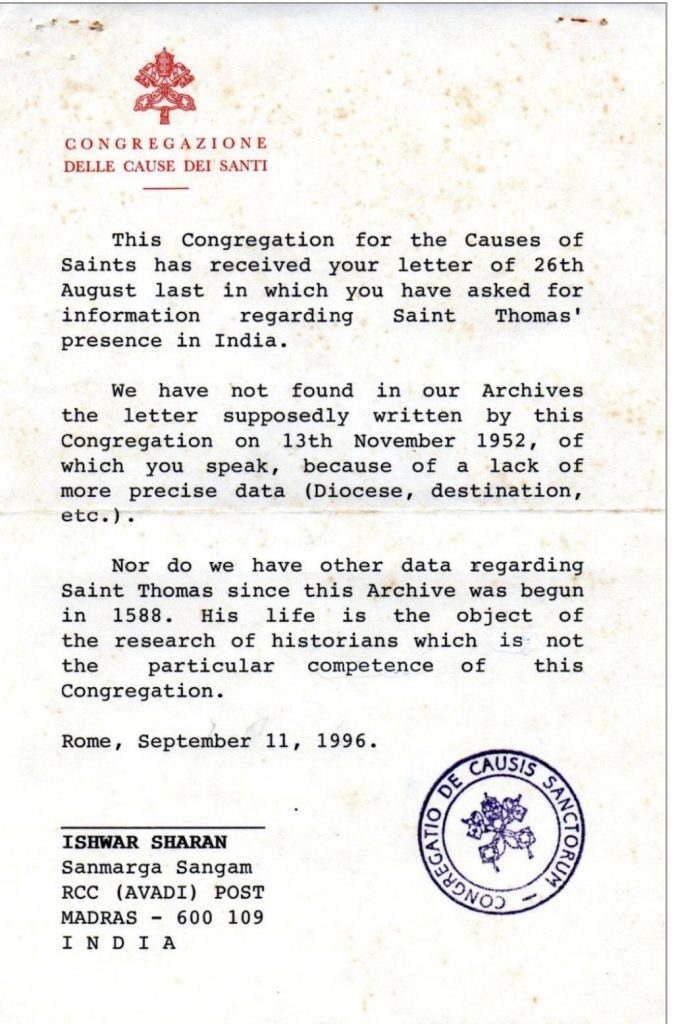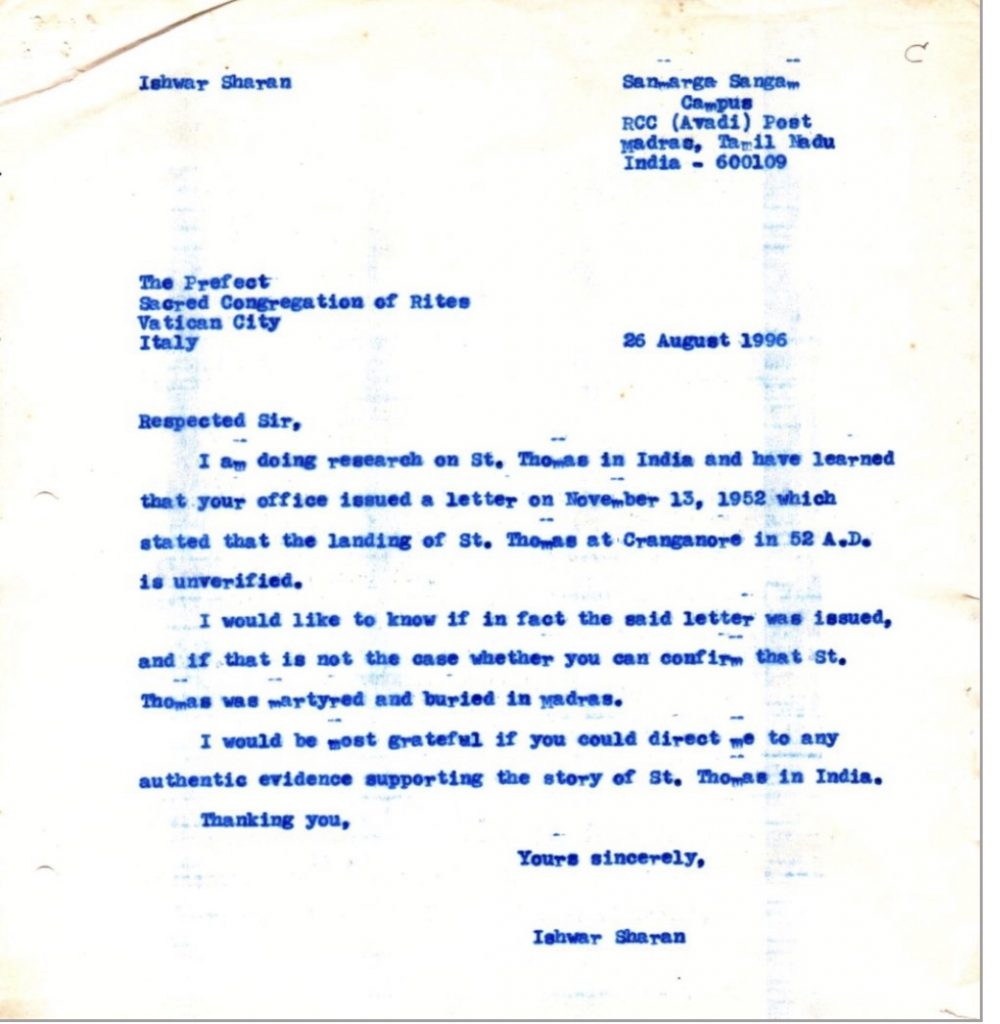When Prime Minister Modi mentioned the Mar Thoma Church in Kerala is closely linked with the noble ideals of Saint Thomas, the Apostle of Lord Christ,” it created uneasy and uncomfortable moments among audiences, who felt heavy as if a fiction was made come alive.
On 27 June, via video conferencing, PM Narendra Modi addressed the 90th birth anniversary of Rev. Dr. Joseph Mar Thoma Metropolitan, 21st Marthoma Metropolitan and the current priest of the Mar Thoma Syrian Church, which is also called the Malankara Mar Thoma Syrian Church. While wishing him a long life and good health, Prime Minister Modi mentioned “the Mar Thoma Church is closely linked with the noble ideals of Saint Thomas, the Apostle of Lord Christ.” PM Modi went on to say, “India has always been open to spiritual influences from many sources. The contributions of Saint Thomas and, following him, the Indian Christian community are deeply valued. Although, PM Modi didn’t refer that St Thomas had ever visited south India, nevertheless it appeared as if his words injected life into a fiction that has been spread since the time of Portuguese, hence his address triggered a debate.
When the prominent Twitter handles @missionkaali responded PM Narendra Modi in a series of thread, it was a divulgence that many of Christian faith are unaware of.
Who was St. Thomas?
Known as doubting Thomas—who had refused to believe that the resurrected Jesus had appeared to the ten other apostles—was said to be one of the 12 disciples of Jesus. Thomas’s subsequent history is uncertain.
St. Thomas travelled to evangelise South India in first century is myth?
As website of Malankara Mar Thoma Syrian Church believes that their Church had been founded by Saint Thomas, which means Mar Thoma in Aramaic language, however many experts call it myth. Even, Pope Benedict XVI too, denied St. Thomas evangelised South India, writes Ishwar Sharan.

On 27 September 2006, Pope Benedict XVI, while addressing faithful, stated—Let us remember that an ancient tradition claims Thomas first evangelised Syria and Persia and then penetrated as far as western India from where Christianity reached also south India—which means St. Thomas never travelled to south India, but rather evangelised the western front, mostly comprising today’s Pakistan. But, the Pope’s statement was changed the very next day on the Vatican website, to include South India in Thomas’s travels was shocking.
What about historical proofs of St. Thomas ever visited South India?
No historical evidence ever existed to support the claim that St. Thomas ever set his foot at South India. On 13 November 1952, Vatican officials sent a message to Kerala Christians stating that the landing of St. Thomas at Muziris (Cranganore now Kodungallur) on 21 November 52 AD was “unverified”. When Ishwar Sharan tried to seek confirmation of the 1952 Vatican statement in 1996, the Vatican’s reply was non-committal.
When Pope John Paul II visited India twice in 1986 and 1999 and prayed at the alleged tomb of St. Thomas in San Thome Cathedral, he said nothing to confirm St. Thomas’s visit to South India or Mylapore in the first century. Pope John Paul II is himself an avid missionary, who openly promote and propagate conversion. Why didn’t he support the agenda of St, Thomas visiting India in first century? Certainly, this has offended the Syrian Catholic Church, as the statement questions their very origin. Syrian Catholic Christians trace their origin to upper-caste Hindus said to have been evangelized by St Thomas upon his arrival in 52 AD.
Was the propaganda deliberately rooted to cover up the fact that Christianity came to India with persecuted Syrian Christians, who came to Malabar to seek asylum at the end of 4th Century? They came from the Region of Antioch and Damascus as they were persecuted in their own country. They were well received and looked after. They didn’t have evangelising zeal until Vasco de Gama with his Portuguese entourage discovered India in (1497-1499). He combined trade with conversion. Onslaught of conversion started.
Was the propaganda of “St. Thomas had come to India” have been carried out since ages to sanctify Christianity in India? Would this question ever find its answer?
Please follow @missionkaali over Twitter.
MissionKaali.org: Born out of the need to unite grass root organisations that are engaged in the fight to safeguard Dharma against Abrahamic traditions!


Sri Kapaleeswarar temple, in Mylapore, is possibly the most important shrine for Lord Shiva in Chennai. In fact, it was originally located on the beach, exactly at the place where St. Thomas Cathedral now stands. That the Portuguese destroyed the temple, planted the church, created the St. Thomas myth, and named the place Santhome are historical facts that only the biased and the converted would ignore. According to a plaque at the entrance of the temple, “Mylapore fell into the hands of the Portuguese in A.D.1566, when the temple suffered demolition. The present temple was rebuilt 300 years ago. There are some fragmentary inscriptions from the old temple, still found in the present Shrine and in St. Thomas Cathedral.”
As far as the St Thomas myth is concerned, this is the truth: Thomas of Cana, also known as Knai Thoma, led the first group of 72 Syrian Christian families to India in CE 345 to escape persecution. There is no record of Christian communities in India before this date. Thomas of Cana and his companion, Bishop Joseph of Edessa, also brought with them the tradition of St. Thomas the Apostle. Later, Christian communities in Kerala would identify Knai Thoma with Mar Thoma—Thomas of Cana with Thomas the Apostle—and claim St. Thomas had arrived in Kerala in CE 52 and established the first Christian church at Musiris—an ancient port, near present day Kodungallur—the main trading post at the time.